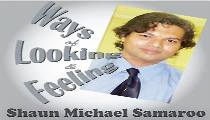My first job after graduating Central High School saw me turn up to work every morning to face a blank blackboard.
As a teenager, I worked as a teacher at Grove Government School, and I had to work from a Lessons Plan I had prepared to fill that board with new knowledge for my students. Each day I had to teach these rowdy kids some new knowledge.
 I had to fill the blank space of young minds with new thoughts, ideas and knowledge.
I had to fill the blank space of young minds with new thoughts, ideas and knowledge.
The work of a dedicated teacher brings such value to the lives of children growing up to face the world as adults. The work of teachers shapes the world.
Since I wanted to be a Journalist, I soon got a job at the new Stabroek News, and started work every day with a blank sheet of white paper sitting at my old, rickety manual type-writer.
It’s hard to imagine how I worked then. It was 1990, and the world had not yet computerized.
So I had a year or so working on that type-writer before computers swept in and took over.
Today, I start the day with a blank computer screen, as a writer, knowledge-designer, columnist and novelist.
Reflecting now, I see this lifestyle of starting out staring at a blank space, and creating words to convert that space into something inspiring and beneficial, defines how I live.
As a teacher, I used words on the blackboard to educate the minds of the young kids. As a Journalist, I use words on newsprint and the Internet, and occasionally on TV in Ontario, Canada, to inspire an audience with ideas of value.
It’s a rewarding way for me to live, this converting of blank space into words of ideas, knowledge and inspired new ways of looking and feeling.
One memory stands out for me as a young Journalist working for this outstanding newspaper, the Stabroek News. I biked to work on a red 10-speed bicycle from my home at Ketley Street, Charlestown.
On Monday mornings biking to work, I exercised serious intellectual effort to come up with two new story ideas for the Editorial meeting hosted by Editor-in-Chief David de Caires in his spacious attic office.
Mr de Caires insisted that reporters start each day with two new ideas for stories. So every morning I woke up thinking that I need two really good ideas.
This became such a valuable habit to me, so that today I live the same way, always thinking of new, solid ideas that would shape and impact my community.
This way of being saw me write stories and interview people from all walks of life. Publishing for readers to benefit inspired me, filled me with a sense of purpose and meaning, knowing that my days were spent impacting others.
At the Editorial meeting, we pitched our ideas to de Caires, and we tossed these ideas around in discussion.
By the time we were done, with inputs from such excellent Journalists in Sharief Khan and Charles de Florimonte, and Cecil Griffith when he was there, I would be so inspired to tackle the day ahead.
Each day was new. Yesterday’s newspaper was over and done with. Today, there’s a new newspaper to fill, not only to inform readers, but to shape the new democracy.
Those were exciting days for me. Those days of my early youth taught me enormously valuable life skills. I believe these skills to be essential life skills for the young people of today.
I learned to start each day as a fresh blank page, to realize that yesterday was over and done with, and today offers new opportunities to publish inspiring, impacting stories.
For the new generation growing up in this country, the past means nothing.
The older generation still talks about the ethnic violence of the 1960’s, and this election year we would see continuing effects of that ancient past in racial voting patterns.
Many of the younger leaders denounce this aberration of our body politic.
The past still pulls us into the pit of ugly social chaos.
But we are a new generation, here to create a new socio-cultural environment for this land. As the 21st century unfolds, with the global village in turmoil in many places, the Guyanese nation stands blessed and able to offer a ray of hope to the world.
In this land, we can create a nation of people starting each day looking for fresh new ways of impacting the world, instead of looking back at our yesterdays to bemoan our sad socio-economic state of being.
For this new way of being in the nation, our political leaders must take on the challenge of inspiring us forward.
The Canadian-born Journalist who has done great stories for the New York Times, Malcolm Gladwell, wrote a book called ‘blink’.
The book became a text-book on social-engineering, as Gladwell probes with that keen Journalistic eye into the why of the way we make choices.
On his website gladwell.com/blink, he said that he got the idea for the book after he noticed that growing his hair long and wearing it “wild” caused a transformation in his social life.
As a black man in America, he started being pulled over a lot more by cops.
“Something about the first impression created by my hair derailed every other consideration in the hunt for the rapist, and the impression formed in those first two seconds exerted a powerful hold over the officers’ thinking over the next twenty minutes”, he writes.
The book delves into how we human beings choose, and the role of the first split-second in our social behaviour. Gladwell found that that split-second shapes the choice we make.
So it is every day. As we wake up every morning, too many of us start it with a “blink” reaction based on yesterday. Too many of us start the fresh new day in that first split-second of facing a new day, with the page, the board, the space not blank and filled with opportunities, but filled cluttered with yesterday’s happenings.
Thus, we fail to create a new, inspired day. And life drags out mundane and bare and uninspired.
What I learned as a teacher and a Journalist and a creative writer is that the “blink” moment in starting my today is a blank space, ready for me to create something new, fresh and inspiring.









